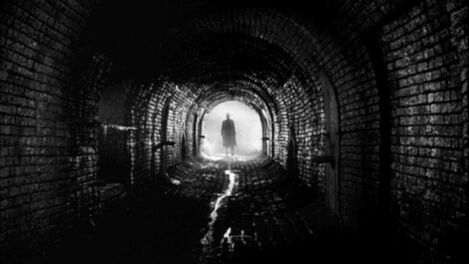C | A hack writer searches for the circumstances surrounding his friend's death in postwar Vienna. Directed by Carol Reed Starring Joseph Cotton, Alida Valli, and Orson Welles Review by Jon Kissel |

Reed’s direction, with cinematography by John Seitz, is another thing that needs context, or else it might be bad. I don’t know if Dutch angles, where the frame is tilted so it looks like everything’s about to slide into the corner, were a thing in 1949 or if Reed and Seitz invented then. If they were well-established, then this is as egregious as frankly any modern use of now-outdated and corny Dutch angles. If it’s the latter, then congratulations to Reed and Seitz for coming up with the tell-don’t-show visual method of demonstrating confusion and disorientation. Neither scenario is better than the other in judging The Third Man. I just don’t like Dutch angles.
Something that The Third Man did not invent is a villainous shorthand which immediately undercuts any mystery the film is clearly going for. To the surprise of no one, Ernst Deutsch as the Baron is a nefarious figure, as is his colleague Popescu (Siegfried Breuer). Both well-dressed men with European accents, though the Baron has a face like a cobra and Popescu’s overweight. You mean these mustache twirlers are hiding something from Martins? You don’t say! Silent film villains have been tying women to train tracks for decades prior to The Third Man, so this exists at a time when audiences were trained to spot bad guys before a word comes out of their mouth. The film starts with a voiceover about how everyone in Vienna is compromised, which is enough to make the viewer suspicious of the whole city, but Reed forces the issue with these two casting choices.
Martins isn’t impressing as a man way in over his head, and his mid-century relationship with Anna (Alida Valli) is absurd but it’s absurd in a way that most relationships are from movies of this period. What 100% works in The Third Man is the grand reveal of Harry Lime’s (Orson Welles) continued existence, which single-handedly justifies The Third Man as a persisting work of cinema, though it’s not so overwhelming that this justifies the film’s overwrought praise. Martins’ bumbling takes a long time, but the build-up to Lime makes it seem like a distant memory. Welles is a decade off of his directing arguably the greatest film ever made with Citizen Kane, and a person doesn’t make a film like that if he’s a man of his era. Welles is well ahead of his time, and he has the look and carriage of a protagonist from the 70’s New Hollywood era, not the steady sameness of studio-produced leading men. He’s in a totally different movie than anyone else in The Third Man, and his mere presence stepping into the street light elevates a film that had thus far not elevated itself.
After Lime is introduced, Welles is only in a couple more sequences, but each is excellent. His speech on the Ferris wheel is a post-war encapsulation of how a survivor might’ve viewed humanity at that time. When armies are churning up people at the rate of millions, how could that not change how someone values life, either for better or for worse. I wouldn’t be surprised if Steve Bannon is a big Third Man fan, as he subscribes to a cyclical theory of history similar to Lime’s aside about the great works that came out of unstable Renaissance Italy. I also wouldn’t be surprised if Bannon snuck into hospitals and diluted medicine, but here nor there. The climactic sewer chase is impressive, with Welles acting out the growing panic of the situation and even inspiring some amount of sympathy for this awful person, though it’s the kind of sympathy one might have for a cornered, man-eating wild animal. The Third Man ends strongly with Anna’s funeral brush-off, but it omits the obvious ending of Lime still being alive, as we don’t see him dead. Such a charismatic antagonist somehow escaping doesn’t fit with the prescribed cinematic reality of the time, but movies have since taught viewers to be wary of these kind of hanging threads and Reed instead ties it off.
As strong as Welles is, there’s a lot of choices in The Third Man that I can’t get behind. That score has no business being in this kind of film. The plot is too simple to communicate the depth of Vienna’s corruption, so it misses on a pervasive sense of place, though the rubble piles do some of that work. It’s fine that Martins is not a perfect protagonist, but on the scale of sins I’m willing to tolerate, intellectual fraud and mediocrity isn’t one of them. Welles should have emerged earlier, because when he finally does, I was close to fully checking out, and I wouldn’t blame anyone else for already having done so. He makes those last thirty minutes worth it, but did the run-up to his reveal have to be so laborious? I don’t understand what the fuss is with The Third Man. This is up there with The Great Dictator for mid-century, critically-acclaimed, persistent films that I do not get. C+
 RSS Feed
RSS Feed